Rising of the S.U.N.: Guitarist Brian Tichy Discusses New Project With Sass Jordan

Brian Tichy has built an impressive resume of recording, touring and/or writing with artists like Ozzy Osbourne, Billy Idol, Whitesnake, Foreigner, Lynch Mob and T&N.
Known for his phenomenal drumming, Tichy now showcases his equally versatile guitar prowess in S.U.N (Something Unto Nothing), his new project with vocalist Sass Jordan. S.U.N.’s debut album is reminiscent of the classic big album sounds of the 1970s. It's raw, real music from the days when records were played on a turntable and cranked up to 10.
Proving the old adage that birds of a feather flock together, Tichy and the band were recently joined onstage by guitar god Jake E. Lee for a rendition of the Led Zeppelin classic "Rock and Roll." How apropos.
I spoke with Tichy and got the inside scoop on the new S.U.N. album and tour plans, as well as his dual role as drummer and guitarist.
GUITAR WORLD: How did you get hooked up with Sass?
Sass and I met when we did her Rats record back in ‘93. I was friends with her guitar player, Stevie Salas, and he invited me out to jam. At the time, he also happened to be writing with Sass. They both asked me to go in and demo a song for them, which ended up being "High Road Easy," the first single and video from the album. I hadn’t really talked to her since '95 or ’96.
In 2010, through some social media outlet, we were able to reconnect and thought it would be fun to get together again and write. I thought maybe something we did might go on her next record. So we wrote a few songs together over the course of the year. In 2011, before I went out on the Whitesnake tour, Sass came back out and we wrote again. We soon realized there was so much of “us” in what made the songs sound the way they did, so we decided to create a band.
Get The Pick Newsletter
All the latest guitar news, interviews, lessons, reviews, deals and more, direct to your inbox!
What was the songwriting process like for the album?
We never mailed each other songs or ideas. We had to do it together in the same room. Even though it might have been easier to go back and forth, there’s nothing that beats the inspiration of the moment. That’s how the record was made. Michael Devin [Whitesnake] played bass on the record and co-wrote some songs as well.
Tell me about some of the songs from Burned.
"Burned": "Burned" is the lead-off track and the first idea I had written for Sass. Before we got together, I asked myself, “What’s best about Sass?” She’s such a great singer and has a great outlook and spirit about music. She also has great tone, a great groove and great power. She commands an audience and the listener. I thought, "Let’s start off the first song with an open space that she can fill in the blank with and I’ll make a riff."
The song has a Zeppelin/"Black Dog," "Still of the Night" [Whitesnake] kind of vibe, and that’s what I wanted to show with her. My vision was, "It’s the first song with Sass, so just let her go for it!" I showed her the riff and space where she should sing, and she just went for the high note, and it was awesome! The first line she wrote and the first melody she sang is exactly the first line you hear on the record.
"Crazy Head": I love writing riffs, but sometimes you just want to sit there and chug on three chords a la Billy Gibbons, Malcolm Young or Steve Miller. You just pound out the groove and let the singer take over. So we wrote "Crazy Head."
"Nomad": Sass said she wanted to write a song called “Nomad” and she wanted it to be kind of heavy. I had my guitar tuned to a lower tuning, started playing the riff and she started singing on top of it. As soon as she started singing that first line I said, “That’s it!” and we had another song.
Do you have plans to take S.U.N. on the road?
We’ve just finished a few shows and our CD release. We’re looking at a few ideas right now and hope to solidify them in the next few weeks for a spring run. We need to be seen.
Jake E. Lee joined you onstage at your show in Vegas. What was that experience like?
Jake first came to a S.U.N. show back in April and just to have him there was cool. Tommy Stewart [drums] and I are totally into Badlands. I even saw them a few times back in 1989. For this show, Jake texted Sass and just said, “What am I playing?” [laughs]. We told him to just show up and we’ll do "Rock and Roll." While he was there at sound check, we also ran through "High Wire" [the lead off track from Badlands’ first record]. He even showed me some of his licks and the correct way to play the intro and solos to "Bark at the Moon." I was getting schooled by Jake E. Lee, and it was killer.
You’re known primarily as a drummer, but you’re also an amazing guitarist.
I was always a drummer who loved guitar. In high school, I was actually playing more guitar than drums. I used to have all of my guitar buddies show me AC/DC or Deep Purple riffs and blues scales. Once Yngwie came out, I realized I needed to learn theory, so I got into learning modes and scales and how they’re all related. The more you know about how chords are related to each other, the more it helps you understand things better.
I used to play drums and then pick up the guitar for four hours every day; just learning things. When I went to Berklee, I was doing six days a week, six hours a night on drums and in between the drums I’d go into my dorm and just play guitar. That’s all I would do. It never ended. So, I’ve been playing guitar my whole life.
What do you like most about your role as guitarist in S.U.N.?
I love the guitar part of the band, and now I get to do it with arguably the best female singer in rock. She has a gift. There are a lot of talented people out there, but this record is exactly what she does. Sitting in the loft with me, with no control room or separate isolated room. She sings into a mic and belts it out, and what you hear is exactly what goes on.
What are you most proud of about this project?
This record was consciously made. One of the first things I said to Sass was that I didn’t want to use a click track or samples and auto-tune. The reason you play music is because you practice your whole life to become the player you are. I associate the groove with the band.
Also, these songs were all first time put downs. We put everything down with the inspiration of the moment. That’s why a lot of the reviews say the album sounds so real and raw. People are saying it “sounds like the '70s” with “real” drums and “real” guitars and that’s exactly what we wanted. We wanted this to be an album you listen to from top to bottom. One that you can put in the playlist with all of your other classic records. That’s how Sass and I both like to listen to music.
For more on S.U.N. (Something Unto Nothing), visit their official website and Facebook page.
James Wood is a writer, musician and self-proclaimed metalhead who maintains his own website, GoJimmyGo.net. His articles and interviews are written on a variety of topics with passion and humor. You can follow him on Twitter @JimEWood.





James is a guitarist and freelance writer who's interviewed some of the biggest names in music. He is the author of four books and his writing credits include work for Guitar World, AXS and Yahoo! as well as for his hometown newspaper where he writes on a variety of topics with both passion and humor. As a guitarist, he's performed everywhere from local bars and nightclubs to some of the biggest stages in front of thousands of music fans.
“The Strat was about as ‘out’ as you could get. If you didn’t have a Floyd Rose, it was like, ‘what are you doing?’”: In the eye of the Superstrat hurricane, Yngwie Malmsteen held true to the original
“He got that from me. I used to throw my guitar as high as I could, like, 20 feet, and my guitar tech would catch it”: Dez Dickerson on Prince, his iconic Little Red Corvette solo, and why he left the Revolution










